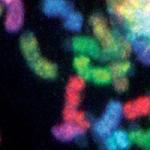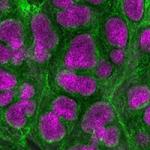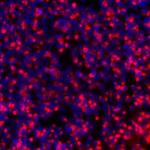
Pedro P. Rocha, Ph.D.
Stadtman Investigator
Unit on Genome Structure and Regulation
NICHD/DIR
Research Topics
Packing two meters of DNA inside ten-micron nuclei leads to a very crowded environment. This is an extraordinary feat of compaction and organization because cellular processes such as DNA repair, replication, and transcription must occur within such a dense setting. We have all seen how electric cables become invariably entangled and non-functional inside our drawers. Cells face the same problems and therefore developed mechanisms that organize the physical structure of the genome and ensure its regulation and integrity. Our lab studies how genome folding not only fits DNA within the constraints of the nuclear space but also is used as a critical mechanism of gene regulation. This is particularly important during development because dysregulation of gene expression causes severe birth defects.
We have shown that variations of just a few nucleotides of DNA sequence, can disrupt genome architecture, dysregulate gene expression, and severely compromise mammalian development. In addition, some of the animal models we developed are being used to test therapies for defects caused by abnormal genome structure. While centered on embryogenesis, our work will shed light on how cell type-specific transcriptional programs are established, with broad implications for cell fate decisions in other disease contexts such as cancer.
Biography
I studied Microbiology and Genetics in Portugal, at Lisbon University and graduated in 2005. I then moved to Germany for my PhD where I worked in the lab of Heiner Schrewe at the Max-Planck Institute for Molecular Genetics in Berlin, studying the role of transcriptional co-regulatory complexes during mouse development, as part of a Marie Curie-sponsored international consortium. For my postdoctoral training I moved to the United States and joined the lab of Jane Skok at New York University, to explore multiple ways by which nuclear organization maintains genomic integrity. Our lab at NIH, started in May of 2018 and we focus on understanding how the mechanisms that fold the genome contribute to regulation of gene expression and cell-fate decisions.
Selected Publications
- Chakraborty S, Wenzlitschke N, Anderson MJ, Eraso A, Baudic M, Thompson JJ, Evans AA, Shatford-Adams LM, Chari R, Awasthi P, Dale RK, Lewandoski M, Petros TJ, Rocha PP. Deletion of a single CTCF motif at the boundary of a chromatin domain with three FGF genes disrupts gene expression and embryonic development. Dev Cell. 2025;60(13):1838-1853.e9.
- Chakraborty S, Kopitchinski N, Zuo Z, Eraso A, Awasthi P, Chari R, Mitra A, Tobias IC, Moorthy SD, Dale RK, Mitchell JA, Petros TJ, Rocha PP. Enhancer-promoter interactions can bypass CTCF-mediated boundaries and contribute to phenotypic robustness. Nat Genet. 2023;55(2):280-290.
- Thompson JJ, Lee DJ, Mitra A, Frail S, Dale RK, Rocha PP. Extensive co-binding and rapid redistribution of NANOG and GATA6 during emergence of divergent lineages. Nat Commun. 2022;13(1):4257.
- Kurotaki D, Kikuchi K, Cui K, Kawase W, Saeki K, Fukumoto J, Nishiyama A, Nagamune K, Zhao K, Ozato K, Rocha PP, Tamura T. Chromatin structure undergoes global and local reorganization during murine dendritic cell development and activation. Proc Natl Acad Sci U S A. 2022;119(34):e2207009119.
- Zuo Z, Rocha PP. Repetitive Elements: Different Subtypes Hint at Distinct Functions. Trends Genet. 2020;36(6):385-387.
Related Scientific Focus Areas





Molecular Biology and Biochemistry
View additional Principal Investigators in Molecular Biology and Biochemistry
This page was last updated on Wednesday, December 3, 2025